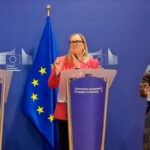10 recommendations for the EU to boost sustainable finance in emerging economies
Antoni Ballabriga, Global Head of Sustainability Intelligence & Advocacy at BBVA and member of the EU High-Level Expert Group (HLEG) on Scaling Up Sustainable Finance in Low and Middle-income Countries, explains the key findings and recommendations that the HLEG will submit to the European Commission.

The final report from the EU High-Level Expert Group on Scaling up Sustainable Finance in Low and Middle-income Countries (HLEG) mandated by the European Commission is released. The group’s primary tasks were to identify the challenges and opportunities of sustainable finance in low- and middle-income countries and to provide recommendations to the European Commission on how to increase resources from private capital to close the current SDG financing gap and to accelerate private financial flows for the implementation of the Global Gateway, the external dimension of the Green Deal to support a green, just and resilient recovery in the EU partner countries.
As stated in the report “the sustainability challenge is a global one, requiring global solutions that leave no one behind” and there is a widening global gap in the finance needed for the achievement of the SDGs, estimated last year by the OECD at USD 3.9 trillion per annum. Increasingly stretched public funds and concessional finance are clearly not sufficient to bridge this gap. In my opinion, we need to reimagine how sustainable finance works to attract private capital at scale and provide financial and technical support to all emerging markets and developing economies and ensure a fair and inclusive transition. The EU can play a key role promoting the enabling environment to make it happen.
“The sustainability challenge is a global one, requiring global solutions that leave no one behind”
The HLEG brought together during 18 months a diverse group of 20 international experts representing a broad range of expertise, both financial and non-financial, including EU cross-border investors, local investors, local businesses, civil society, standard-setters and academia. BBVA has had the privilege of being a member and his role has been critical to share the experience and views as a private lending institution with a strong track record in emerging markets and partnering with multilateral development banks.

Commissioner for International Partnerships, Jutta Urpilainen; Managing Director of the International Monetary Fund, Kristalina Georgieva; and WWF Senior Director of Policy Influence and Engagement, Alice Ruhweza; together with members of the High Level Expert Group (HLEG).
These are the 10 summarized recommendations to the European Commission included in the report:
- To develop a new strategic engagement model with Low and Middle-Income Countries (LMICs) based on a high-level political, economic, social, business and regulatory dialogue, to provide a coordinated EU offer. This model should bring together key stakeholders on the partner country’s side with the EU, its Member States, DFIs, the EIB, EU investors and EU businesses.
- To provide financial support in a more agile and fit-for-purpose to scale up sustainable project development.
- Enhancing the agility and capacity of its EU external financial support while selecting the most effective (combination of) EU budgetary instruments in mobilizing private capital, adapted to the context.
- Creating a single EU digital platform as an entry point for sustainable projects in LMICs, which would help coordinate and manage the development of sustainable projects through their lifecycle.
- Calling for MDBs to adjust their mandate, business models and incentive structures to enhance at scale private sector mobilization for SDGs, including climate actions. Further, calling on EU Member States to reassess and reform their national DFIs’ mandate, business models and incentive structures with respect to private sector mobilization objectives.
- Together with MDBs, including the World Bank, the IMF and DFIs, should set up a bold initiative to support sustainable asset recycling and securitisation (asset-backed securities) in LMICs, where appropriate, to create the fiscal space needed for their sustainable and resilient infrastructure investments.
- To allocate dedicated resources to disaster risk financing for LMICs, and support the uptake of instruments such as CAT bonds and risk pooling. In doing so, the Commission should explore approaches to combine insurance and adaptation/resilience financing and integrate a resilience lens across MDBs’ and DFIs’ investments.
- To provide technical assistance and funding research on measuring social impact and risk accurately, and exploring merits of supporting mature areas of social financing, such as mobilizing private finance through sovereign, sub-sovereign or other public sector issuances of social and sustainability bonds.
- Together with DFIs and MDBs, should help LMICs tap into more private finance for restoring their natural capital, through scaling-up high-integrity carbon and biodiversity credit markets, and for preserving natural capital building on the landscape approach and other innovative financial mechanisms, including bonds related to the conservation of biodiversity.
- To step up its support to help partner countries put in place the building blocks and legal reforms, underpinning the development of well-functioning local capital markets (including insolvency laws, prudential rules, market transparency and market integrity safeguards, investor protection, market supervision).
- To address the question of risk-return for the EU investors vs the cost of financing for beneficiaries:
- Fostering fully-fledged local capital markets in LMICs. European Commission should support local currency-denominated sustainable financial instruments and, to that end, consider establishing a sizeable local currency sustainable finance facility to be funded in local currency in a way that it reduces its FX exposure, relying on the presence and appetite of (notably local) institutional investors.
- Recognising de-risked public- private transition and/or sustainable funds in LMICs appropriately in the EU financial legislation through a dedicated EU legal framework. Such a framework should also ensure that EU prudential treatments accurately reflect the associated risks, taking into account the de-risking mechanism of the structure and the quality of the underlying assets.
- In order to address the root causes of systemic high FX risk in LMICs and the very prohibitive cost of hedging, relying on the input of public and private sector experts in the field of FX in LMICs through a dedicated Taskforce.
- To provide coordinated technical assistance support through a dedicated and well-resourced Sustainable Finance Advisory Hub, helping LMICs develop credible sustainable finance frameworks (taxonomies, disclosure requirements, standards) while promoting interoperability.
- To develop a dedicated program to support SMEs in LMICs accessing sustainable finance, including those operating within global sustainable value chains, with the right financial and non-financial incentives.
Members of the High Level Group included renowned figures in the field, such as Hans-Ulrich Beck, Head of Regulatory Readiness at Sustainalytics; Laetitia Hamon, Head of Sustainable Finance at the Luxembourg Stock Exchange; Judy Kuszewski, former Chair of the Global Reporting Initiative's (GRI) Global Sustainability Standards Board; Elodie Laugel, Chief Responsible Investment Officer at Amundi; Nicola Ranger, Executive Director and Programme Leader at the Oxford University Environmental Change Institute; Alice Ruhweza, Senior Director of Policy Influence and Engagement at the WWF; and Thede Rüst, Head of Emerging Markets Debt at Nordea Asset Management.
On September 30, 2022, BBVA announced its involvement in this EU high-level expert group tasked with providing recommendations to boost sustainable financing in emerging countries and close the current SDG financing gap.